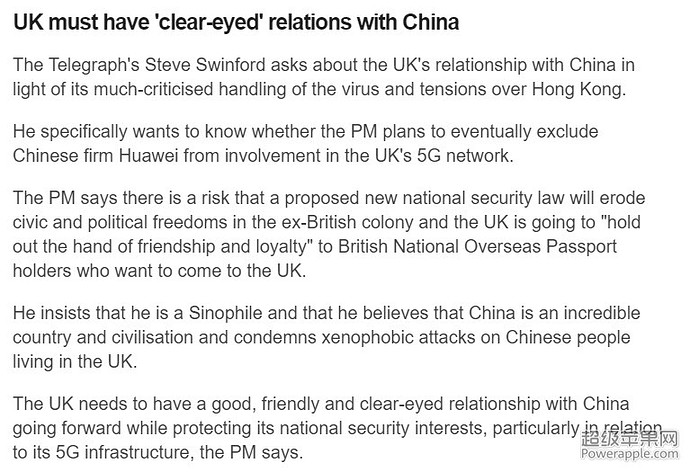查了一下,Sinophile是指亲华的,喜爱中国的意思,BJ这话是不是就是打打官腔啊?
就是我跟你继续好,但是事关国家安全,具体事情还得考虑考虑,无论结果如何都不影响两国继续友好。
虽然这么模棱两可的态度对我们华人有好处。 但是国与国之间交往,英国这种态度就是想两头占便宜,就是没有一个明确的立场。最后可能两头不讨好。糟了美国的恨,中国那边再拆了英国的台。。欧洲那边对英国也一幅冷漠脸。。 ![]()
Boris Johnson on the Hong Kong crisis: We will meet our obligations, not walk away
Boris Johnson
Wednesday June 03 2020, 12.01am, The Times
There is something wonderful about the fact that a small island in the Pearl River Delta rose to become a great trading city and commercial powerhouse of East Asia. Wonderful, but not accidental or fortuitous.
Hong Kong succeeds because its people are free. They can pursue their dreams and scale as many heights as their talents allow. They can debate and share new ideas, expressing themselves as they wish. And they live under the rule of law, administered by independent courts.
With their abilities thus released, Hong Kong’s people have shown that they can achieve almost anything. They have prospered hand in hand with China’s economic renaissance; today their home is one of the richest cities in the world and hundreds of mainland companies have chosen to list on the Hong Kong stock exchange.
So China has a greater interest than anyone else in preserving Hong Kong’s success. Since the handover in 1997, the key has been the precious concept of “one country, two systems”, enshrined in Hong Kong’s Basic Law and underpinned by the joint declaration signed by Britain and China.
This guarantees Hong Kong’s “high degree of autonomy” with only limited exceptions such as foreign affairs, defence or in a state of emergency. The declaration adds: “The current social and economic systems in Hong Kong will remain unchanged, and so will the lifestyle”, including essential “rights and freedoms”.
Yet last month, the National People’s Congress in Beijing decided to impose a national security law on Hong Kong that would curtail its freedoms and dramatically erode its autonomy. If China proceeds, this would be in direct conflict with its obligations under the joint declaration, a legally binding treaty registered with the United Nations.
Britain would then have no choice but to uphold our profound ties of history and friendship with the people of Hong Kong.
Today, about 350,000 of the territory’s people hold British National (Overseas) passports and another 2.5 million would be eligible to apply for them. At present, these passports allow visa-free access to the United Kingdom for up to six months.
If China imposes its national security law, the British government will change our immigration rules and allow any holder of these passports from Hong Kong to come to the UK for a renewable period of 12 months and be given further immigration rights, including the right to work, which could place them on a route to citizenship.
This would amount to one of the biggest changes in our visa system in history. If it proves necessary, the British government will take this step and take it willingly.
Many people in Hong Kong fear that their way of life — which China pledged to uphold — is under threat. If China proceeds to justify their fears, then Britain could not in good conscience shrug our shoulders and walk away; instead we will honour our obligations and provide an alternative.
I hope it will not come to this. I still hope that China will remember that responsibilities go hand in glove with strength and leadership. As China plays a greater role on the international stage — commensurate with its economic prowess — then its authority will rest not simply on its global weight but on its reputation for fair dealing and magnanimity.
Britain does not seek to prevent China’s rise; on the contrary we will work side by side on all the issues where our interests converge, from trade to climate change. We want a modern and mature relationship, based on mutual respect and recognising China’s place in the world.
And it is precisely because we welcome China as a leading member of the world community that we expect it to abide by international agreements.
I also struggle to understand how the latest measure might ease tensions in Hong Kong. For much of last year, the territory experienced large protests, triggered by an ill-judged attempt to pass a law allowing extradition from Hong Kong to the mainland.
If China now goes further and imposes national security legislation, this would only risk inflaming the situation.
Podcast
Back to the Commons or no going back?
The government has U-turned on its controversial plans to end remote voting in parliament, following a backlash from MPs, who feared this would be discriminatory against vulnerable and elderly members. Today we ask: if the world has changed because of coronavirus, is it time parliament did too?
Listen now
For our part, the UK raised our grave concerns about Hong Kong in the UN security council last week; we will continue to do so in international fora. Instead of making false allegations — such as claiming that the UK somehow organised the protests — or casting doubt over the joint declaration, I hope that China will work alongside the international community to preserve everything that has allowed Hong Kong to thrive.
Britain wants nothing more than for Hong Kong to succeed under “one country, two systems”. I hope that China wants the same. Let us work together to make it so.
跟打扑克牌一样,这时候还没到最后手。走着瞧。
好过美国吧
昨天不是还有新闻说5年后可能会承认台湾
那意思就是,我想跟你继续玩,但你打了我的脸,难道我不要面子吗?让我骂两句总可以吧? ![]()

